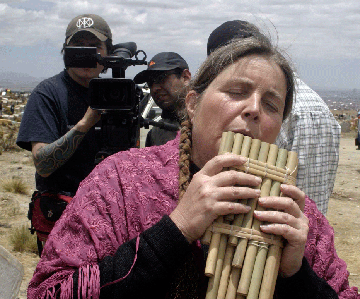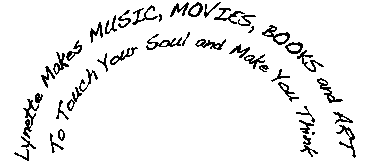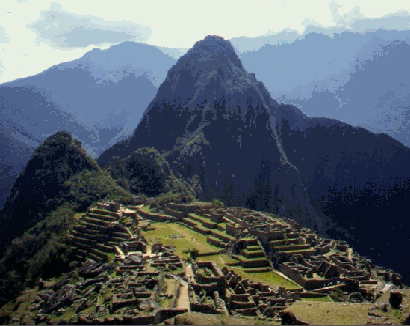|
| Lucy Plays Panpipes for Peace |
Zampoñas
por la Paz |
CLIPS |
72 Money Saving Tips for the 99% |
|
an illustrated Novel by Lynette Yetter, 186 pages
California free-spirit, SGI Buddhist, follows her dream to the Andes and plays panpipes with indigenous guys. (Sound familiar?) :) Lucy is seeking to find or create the ideal society of which the panpipes sing. In Peru and Bolivia she participates in traditional ceremonies, chews the sacred coca leaf, and encounters U.S.-supported human rights abuses that bring her to a life or death decision. 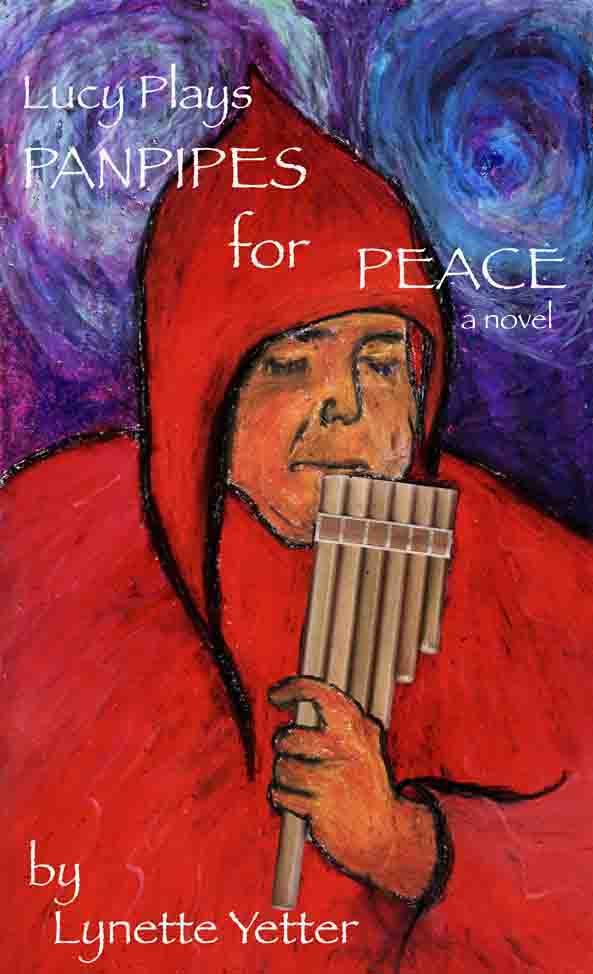 Order FREE pdf ebook now! Lucy Plays Panpipes for Peace, an illustrated novel by Lynette Yetter REVIEW of Lucy Plays Panpipes for Peace By Tantra Bensko Lynette Yetter’s novel draws from her own life when she went to the Andes, pulled by the sound of the panpipes as a tool for transformation. Yet it is fiction, in the way called for in David Shields’ Reality Hunger. It means more knowing she really did something truly audacious and death defying. Here, we get a glimpse of how close to reality it is, and how the fiction made it into the powerful book it is. “Hurtling through space and time, the blue orb was rapidly self-destructing. Vital fluids pumped out of its innards burned in orgies of greed. The vapors ate away its luminous ozone skin. Indigenous Elders, you might call them brain cells of wisdom, were ignored. New synapses of fiber optic cable and satellite rays rationalized the destruction as ‘progress.’ Chaos surged like a flooding river.” Thus begins the story in which Lucy goes to participate in the ancient culture of the Andes. 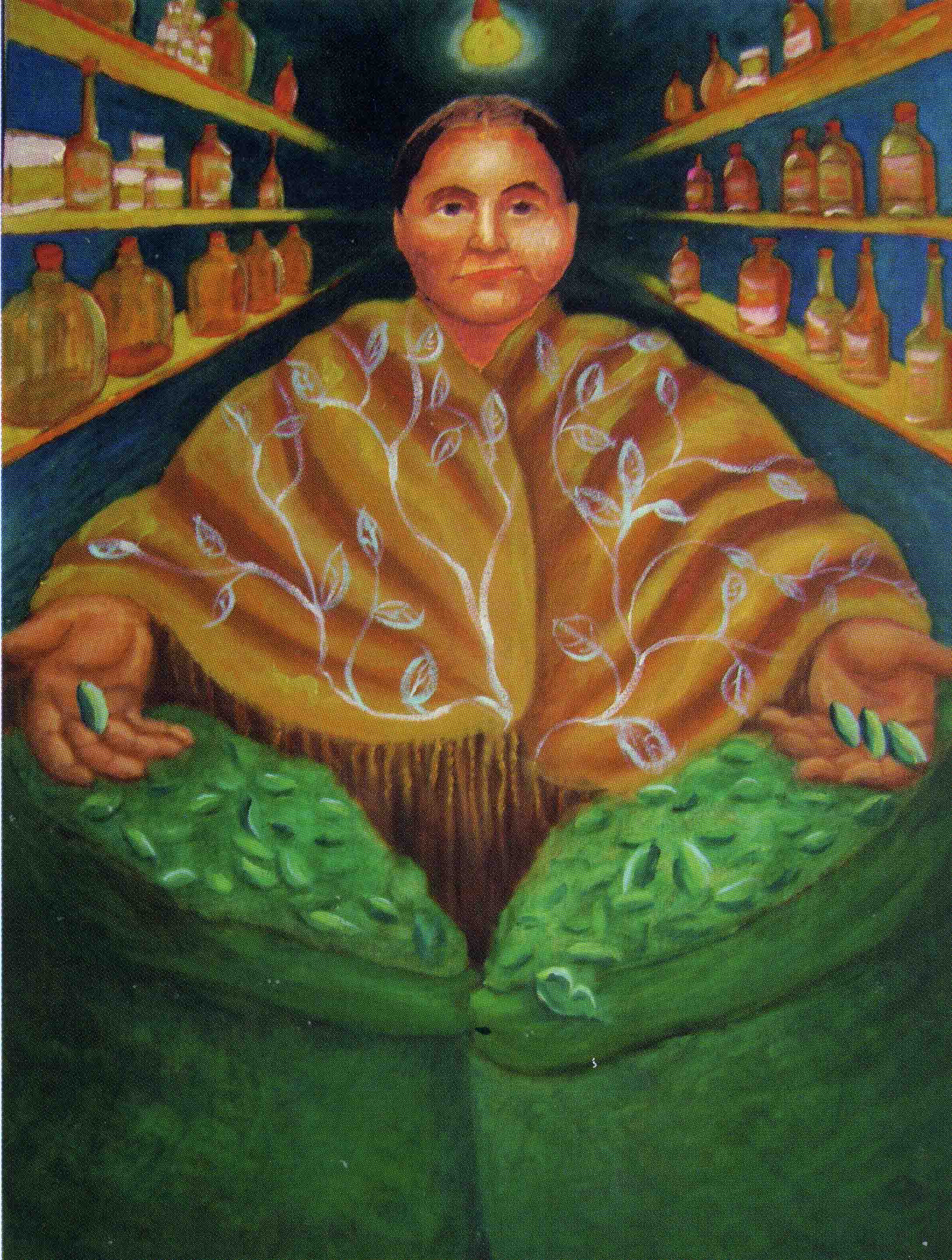 Her words continue to swell when she extends her viewpoint outward, such as “Each person, a black-clad spark of soul, pulled by the inexorable gravity of survival. Together the seething mass of humanity ran. In their black mourning clothes, they were like primordial darkness churning. The light of humanity in their hearts bound each to the other as if to birth a new galaxy of life, in Warrior Town.” It’s obvious Lynette knows how to write powerfully. I also appreciate how real and down-to-earth the language is, how honest and wholesome this book. It’s hip in a DIY kind of way, with Lynette doing a tour on bike for this book as activism inspiring others to follow their dreams and stand up for peace, and play. It also is a great example of what David Shields call for in his manifesto Reality Hunger, which is taking the world by storm now. Lynette Yetter’s Lucy feels real, and the events occurred in the way that anything occurs in our memories—as fiction–stories we’ve told ourselves repeatedly and bundled into plot packages. One of the things I like best is that she includes the vantage point of manifesting and finding our future—and doesn’t just include the times her intentions worked. Her idealism, naïve ideas of the simplicity of finding her heart’s desire are sweet, and ironic when faced with reality. She manages to keep her humor about the ups and downs that causes, though she feels such things very passionately, and they can shake her. Her naïve idealistic determination makes her follow the sound of pan pipes to Peru, where she plays in various venues, joining in with indigenous musicians, as she believes the sound can help create visions of harmony for others as it did for her. She believes she can make a difference to bring more peace to this world through them. But it’s just that quality, and her passionate empathy and love, that create the inspiring events of this book. 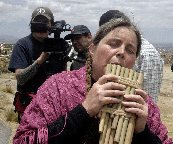 Lucy takes on oppression and segregation, pointing out the false flag of 911, the cultural imperialism of missionaries, the modern tendency to block people out of simply going out and camping under the stars, and she wonders at anomalies of government/military connections. In South America, she plays indigenous peasant music only recently made legal, and has no trouble associating with citizens in the Andes who disrespect unfair political authority, and encourages harmony in dangerous situations. Even in competitive traditions she fosters a sense of oneness. She acknowledges how magical the world is through synchronicities such as running into the man who wrote a song she was playing. Yet, this isn’t a treatise on creative visualization. The irony that can undercut such magic becomes obvious when she gets to know the song’s author. I love that combination. She’s not living out some formula, pretending it always works. So, when her intentions do manifest, her visions do come true, they are far more believable and powerful. We learn about Andean folklore, such as the respectful relationship of miners to the Tios, earth spirits who live underground. We also learn that kusillos are androgynous entities who bridge the known and unknown. And we follow closely: shocking international business practices, the role of civil disobedience in social progress, and the involvement of the U.S. in civil war. This book made me cry for a long time, tremble, and even shout out loud. David Shields would like her book. In his, Reality Hunger, which also came out in 2010, he claims “Most, perhaps even all, good work (or, okay, work that excited me) eludes easy generic classification: once we know it’s coloring entirely within the lines called 'novel' or 'memoir' or 'Hollywood movie,' I honestly don’t see how anything emotionally or intellectually interesting can happen for the reader. . . . Just as out-and-out fiction no longer compels my attention, neither does straight-ahead memoir.” I asked Lynette about the fiction/memoir interface: “My book and reality. It is heavily based on my own personal experience in Peru and Bolivia. In order to better tell the Truth, to express Reality, I chose to fictionalize my experiences. As an old hiking buddy and PhD in English once told me — fiction is where we express the deeper truths of life. In short, she said, ‘Fiction rocks!’ Lucy Plays Panpipes for Peace started out as pure memoir — emails sent to friends and first person stories I told at performance spaces in Los Angeles. But, it was too limiting to stick to chronological events and specific people. By fictionalizing reality I can lump many people into a single character who then becomes an archetype. And in that process, new characters – 100% fictitious – are sometimes born. My favorite is Aunt Bert. Aunt Bert came to me in a vision, you might say. I was riding in a bus along the shores of Lake Titicaca, when suddenly Aunt Bert appeared in my mind. She told me her life story. As I looked out the bus window at the scenery passing by, I was so moved by her life that I even cried at the sad parts. And when I got to where I was going, I wrote down what she had told me. That is how Aunt Bert came to be in the book. Speaking of reality – to me, Aunt Bert is one of the most real characters in the novel – yet she is 100% fictitious. Reality is so multi-dimensional. On one hand, it is the material world we can document with calendars and cameras and weights and measures. Yet it is also the invisible realm of the mysterious that animates all of life – is life. By fictionalizing the material world, I strive to reveal the deeper truths of what is invisible yet is the most powerful truth of all – our own lives.” David Shields asks “A character is either ‘real’ or 'imaginary’?. . . . To be alive is to travel ceaselessly between the real and the imaginary, and mongrel form is about as exact an emblem as I can conceive for the unresolvable mystery at the center of identity.” 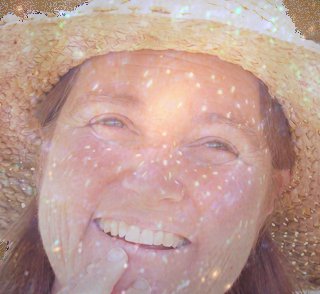 I can feel this book in my heart. I know Lynette bravely accomplished the amazing feats in this story, yet it isn’t a heavy handed recitation of her travels, or an SGI tract, but a call to go into our deepest selves, to cry, because there is a reality there that the fictionalization allows to live in a moving way, inside of us. There is no boundary between story and life, Lucy and Lynette, or our hands, wet with tears, and the pages they turn, which catch the light of the sun, that is not separable from the light of consciousness. Get Inspired to follow your dreams! Review
by Ellen Snortland "The blurb on the back cover of 'Lucy Plays Panpipes for Peace, a novel' is true - 'In many respects, you are an inspiration to me! You walk the talk, and live in accordance with your beliefs." Anyone who has ever dreamed of learning a foreign language (or two) and moving to a remote country seeking a simpler, more authentic life, should read “Lucy Plays Pan Pipes For Peace.” This novel, based on Lynette Yetter’s experiences, opens doors to places and people I never would have known otherwise and I feel richer and more whole for the experience. In a poetic and musical way, our guide sweeps us along with Lucy on her quest to Peru and Bolivia to find or create the peaceful world that she senses in the sound of the panpipes. I laughed and cried and felt inspired as if I, too, were playing the panpipes with indigenous men in traditional festivals or chewing the sacred coca leaf with a Quechua family in a humble adobe house or offering up my own life in protest of U.S.-supported human rights abuses. Spiritual poetry (that amazes me with its creativity), weaves seamlessly with fascinating cultural details (that only an insider could know) and with commentary on globalization as seen from the “globalized” citizens perspective in a way that is natural, thought-provoking and inspiring. Once I started reading I didn't want to stop. Also, I enjoyed the illustrations - they add a whole new level to the experience of questing together with Lucy towards this mystical world of which the panpipes sing. - Ellen Snortland, author of “Beauty Bites Beast” and playwright of “Now That She’s Gone” 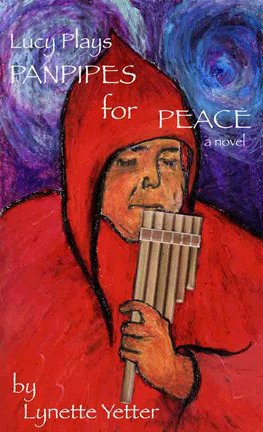
Follow Along as Lucy Discovers the Secret to Living an Authentic Life on a Daring Adventure from California to Peru and Bolivia "If you know someone with an itch to ditch it all and immerse themselves in another world, get them this riveting account. It requires courage and imagination for Lucy to have done what she did, but the main thrust of this story is that if Lucy can do it, so can you. And who can’t use THAT kind of inspiration." - Ellen Snortland, author of “Beauty Bites Beast” and playwright of “Now That She’s Gone.” Buy NOW at local and online bookstores www.musicandes.com etc etc etc LUCY PLAYS PANPIPES FOR PEACE by Lynette Yetter Published
by Lynette Yetter and MusicAndes.com
P.O. Box 411543, Los Angeles, CA, 90041 (323) 284-5595 • Lynette@musicandes.com © 2009 by Lynette Yetter All Rights Reserved. No part of this publication may be reproduced, stored in a retrieval system, or transmitted in any form or by any means — electronic, mechanical, recording or otherwise — without the prior written permission of Lynette Yetter, except for the inclusion of brief passages in a review. ISBN-10: 0-9843756-0-0 ISBN-13: 978-0-9843756-0-8 Printed in the United States of America. For BRUS SORIA Musician, miner, husband and father (May 13, 1942 - September 5, 1982) and LEONCIO HERRERA TORRICO Miner, husband and father and all people who died suspiciously during CIA Operation Condor Table of
Contents
Acknowledgments Chapter 1 Lucy Chapter 2 Dancing at the Blockade Chapter 3 Aunt Bert Illustration – Woodblock print, portrait of Aunt Bert Chapter 4 Oruro Interlude, Letter to Aunt Bert - Guidebook Chapter 5 California Gift Show Illustration – Orqo Warmi Logo Chapter 6 Don Jaime Illustration - Adobe house Chapter 7 Candelaria Illustration – Portrait of Lucy Interlude, Note to Aunt Bert Chapter 8 Conima Illustration - Lake Titicaca Chapter 9 Warrior Town Interlude, Short Letter to Aunt Bert Chapter 10 Meteor Crater Illustration - Space Interlude, Visit to Aunt Bert Panpipe poem Chapter 11 Lucy Plays With the Symphony Illustration – Lucy in Lima Aunt Bert Note Chapter 12 Los Angeles Illustration – Backpack One Sheet Chapter 13 Bolivia Chapter 14 Clay Cookstove Chapter 15 Dorothy and Aunt Bert Illustration - NMRK Express Chapter 16 Red October Appendix A Photograph and Illustration Credits Appendix B Glossary Appendix C Endnotes ACKNOWLEDGMENTS Thank you to my mom, Alta Gale, who provided the love and financial support for me to complete this project. Thank you to Ron Rivera and Potters for Peace for being my Third World mentors. Thank you to everyone I worked with in Gotham Writers’ Workshop. Thank you to Jean Pauline who is the best editor I could ever have hoped for. Thank you to all of my sikuri friends who continue to share life and music with me. Thank you to my brother, Eric Yetter, for being there through everything. Thank you to my stepmother, Voni Yetter, for teaching me that I could do anything I put my mind to. Thank you to my father, Don Yetter, for loving me when I felt unloveable. Thank you to my stepfather, H. Rodney Gale, for loving my mother and welcoming us into your family; without you this book would not have been written. Thank you to Angel Yasmani Mestas Quispe of “Asociacion Cultural del Arte Milenario, Los Heraldos, Sangre Aymara (¡Q’ory Wayra!)” and José Domingo Calisaya Mamani of “Organizacion Cultural Armonia de Vientos Huj’Maya” for reading portions of earlier drafts (in rough Spanish translation) and giving your thoughtful feedback on sections dealing with sikuris. Thank you to Dave Tourje, founder of the Chouinard Foundation and the New Chouinard School of Art, for Chouinard fact checking. Thank you to Deirdre Smith, R.N. for medical fact checking. Thank you to Jean Monte for proof-reading the manuscript and giving feedback. Thank you to countless people, whose names are too numerous to list, for your support and inspiration. Finally and continually, thank you to my mentor in life, Daisaku Ikeda, for teaching me to dream big and that nothing is impossible. CHAPTER ONE LUCY A great human revolution in the heart of a single individual can change the course of human history. - Daisaku Ikeda (paraphrase) Hurtling through space and time, the blue orb was rapidly self-destructing. Vital fluids pumped out of its innards burned in orgies of greed. The vapors ate away its luminous ozone skin. Indigenous Elders, you might call them brain cells of wisdom, were ignored. New synapses of fiber optic cable and satellite rays rationalized the destruction as "progress". Chaos surged like a flooding river. You had only to pause for a moment in that raging current to feel the sadness and despair pounding against you. Your feet (firm on rock riverbed) kept you from being swept away. In that solid stance you felt something deeper than the swirling chaos. That, of course, was hope -- hope that the life of the blue orb could be saved; that you could be saved -- that Hell could be transformed into the Land of Eternally Tranquil Light. But when? And how? It could happen in a moment. And with the subtlest of incidents, like a single breath. Lucy, a 40-something California free spirit who laughed and loved easily (and cried just as easily), encountered that single breath one smoggy summer day in, of all places, Disneyland. She heard a sound that stirred her soul like a gentle breeze blowing away the cacophony of crowds and the worries of paying rent and health insurance bills. She felt like she was floating above a mountain peak, white glaciers all around. The air so pure. In her vision she saw a valley, hand-tilled in green and brown lopsided squares like a crazy quilt. In one of those squares an ox plodded. Behind him a small brown man gripped a hand-hewn wooden plow and steered its point in the Earth. Every muscle of the man’s body focused on his cherished task like a master dancer at the height of his craft. A woman in long handspun skirts twirled around and around, just for the fun of it. Her calloused feet in tire tread sandals, patted the cool freshly tilled earth. The man paused in his work and smiled at his wife. She threw her head back and laughed in pure joy of life. They hooked elbows and spun each other around in the warm sunlight. Grasses in a neighboring square danced with the breeze as a condor pirouetted overhead. Such was the world that Lucy was transported to by that sound. How different was that sound from the whines of those Ritalin-dosed kids over there in line for Space Mountain, complaining to their boob-enhanced mom about an ache, a hunger for something that money could not buy. And how different was that sound from the meloncholy drone of loneliness that orchestrated Lucy’s days. She often felt lonely, even in the midst of a crowd. Sometimes that lonely song in her head got so strong, she yearned for the silence of death. But, this new sound sang of life and sunlight, of living in harmony with the earth. It sang of a soulmate for Lucy. The music was a pied piper pulling her to happiness. Lucy gazed into the eyes of her elderly bohemian Aunt Bert. Aunt Bert had her own private sorrows, but she dealt with them in a different way. Today she was trying to cheer Lucy up by cashing in the two free Disneyland passes she received in barter for some carpentry work she had done. Lucy took Aunt Bert’s sinewy sculptor’s hand into her own and said, “Wanna see where that sound is coming from?” “Here goes Lucy, again,” thought Aunt Bert with an affectionate smile as she let Lucy lead her into the crowd, “I wonder what she’ll get herself into this time.” Like a person mesmerized, or a person waking up from a dream, Lucy searched for the source of that mystical sound. There it was. Just past a fast food restaurant filled with people with distracted eyes - their teeth munching food that was guaranteed not to rot or to give much nutrition - was a group of musicians. They were short brown men, their feet planted like tree roots that tapped into the churning molten core of the Earth. They were playing music that sang primal energy, with only their breath vibrating hollow cane tubes. “Oh those tubes!” Lucy thought, “Who knew that bamboo could sing and cry?” Tears birthed from Lucy's eyes. She was home. At last, she was home. “Yes,” she thought, “This is my life! This beauty and harmony! Millions of years of Earth Wisdom in my bones, bones like fragments of the mountains that I once was!” And then, the sound stopped. Lucy's home disappeared. The song was over. Yet, Lucy now knew she had a home - if only while the panpipes played. It was like a parallel universe she had caught a glimpse of. In that place people lived in harmony with each other, the earth and the infinite. There, she would encounter her Inka soulmate who would dance with her in a fresh plowed field. She set out to find or create that ideal world of which the panpipes sang. CHAPTER TWO DANCING AT THE BLOCKADE When you bow to the Buddha nature in another person, just like in a perfect mirror, the Buddha in that person bows back to you. - Nichiren Daishonin (paraphrase) Lake Titicaca, Puma rock. Glacier melt from ages turned, filled the basin on earth crest thrust high from night marine depths like cupped hands raised with offering to the heavens. Tendril of lake in shape of claw of Puma - liquid lapis someone named "border." I The Peruvian bus driver threw up his hands and shouted at the passengers, "You all need to take your luggage and carry it across to Bolivia and get on a different bus because of the emergency." "He must have a mechanical problem with his bus," Lucy thought. Her heart pounded in the 12,000 foot altitude as she arrived at the door of her dreams - Bolivia. Finally, she would attend the yearly Anata Andino festival, where she would meet the indigenous people who play the music she had been studying and performing with increasing intensity for years. She had applied for a Fulbright as an independent ethnomusicologist, not affiliated with any university. Also, she applied to the MA/PhD program at UCLA's school of World Arts and Cultures. She was waiting to hear from these two programs. In her essays, she wrote that she would travel to Peru and Bolivia in February 2002 to attend specific festivals and lay the groundwork for future fieldwork. Lucy picked up her worn North Face backpack from the bus luggage bay. The backpack, which she bought for five dollars at a garage sale, was stained with oily blotches from some other traveler's meal and brown mud from an unknown foreign land. When hoisting the bag on her back, the strap yanked on Lucy's ponytail of sandy blonde hair. She hadn't cut her hair for over 20 years to be in solidarity with indigenous peoples. She flipped her ponytail free and headed across the Peru/Bolivia border along with the other bus passengers. One of the passengers was a stout Swiss-German man who had more suitcases than children. A wiry porter with a cart hauled his family's luggage. The children held hands and looked with big eyes at the money changers holding fistfuls of bills. Lucy felt a twinge of superiority as she carried her own stuff and didn't need a servant. Little did she know that in future crossings she would be so over-laden, she would make that Swiss-German man look like Gandhian simplicity. A middle-aged passenger from Bolivia maneuvered her small black suitcase on wheels around puddles on the cobble-stones, never splattering its fabric even once. All the passengers lined up at Immigration on the Bolivia side of the river that drains Lake Titicaca, the lake from which the Inka culture sprang. Fluffy clouds roamed like contented alpaca above the green and brown hills that embraced the sacred lake. In front of Lucy, in line, was a willowy backpacker from Switzerland. He said to her, "The Beatles have the answer, you know. All you need is love. It's so easy!" Lucy smiled in agreement. II The Bolivian woman with the small suitcase, the German man with all the children and luggage, the Beatle's fan, Lucy and all the other passengers got on a bus on jack stands. the bald tires were being replaced by somewhat less bald tires. Soon, they were on their way. Just out of town the bus turned off the highway onto a farm road. The farm road, slick with mud, ran along the top of a raised embankment that snaked through fields of potatoes and quinoa. The bus fishtailed back and forth, dangerously skirting the embankment, first to one side, then the other. Everyone got real quiet. They stared out the windows at the scenery careening by like in a drunken nightmare. "Is this the day I die?" Lucy thought. She started chanting quietly with intensity as though grabbing onto a lifeline, "Nam-myoho-renge-kyo Nam-myoho-renge-kyo Nam-myoho-renge-kyo..." Suddenly, deep in her heart, Lucy knew, "No, this isn't the day I die." Everything started to glow with an inner light. "I know I'm going to die someday. But today is not that day. I have a lot more work to do in this life. I know I'm going to get to La Paz. I know that my story goes on." Lucy settled into her seat. The bus continued to slide from side to side on the muddy embankment. She savored the luminescent landscape, clarity more alive than she had ever seen. Poised in that moment in time and space, as if someone had stopped the clock, cranked up the lights and blew off the dust, Lucy appreciated the beauty of everything at her leisure. The bus window seemed to disappear. No longer was there a wall separating Lucy from communing with that bee courting purple potato blossoms who fluttered their petals like unselfconscious children in laughing play. Potato plant leaves were limned in radiance; light of the sun that enters and dances. A dance of transformation; growth, vibrant ever-changing joyous life. Cumulous clouds brilliant as a silver smith's forge should have hurt Lucy's eyes, but didn't. Like that poem she'd written long ago. Bright bright light / too bright for sight. / But just right / for those who are not as they seem. Black moist soil whispered its lover's secrets to Lucy. She listened. Loamy earth was alive with energy that Lucy sensed as part of her own body. She felt as if her central nervous system had extended into the cool soil and impregnated the limitless sky. The pulsing, flow, energy of plants she sensed as if she too was transforming sunlight and mud into roots, stems and leaves that danced in slow motion growth. Distant mountains looked so close, so close. She could see every crevice and feel their ancient song reverberate in her bones. Her bones and that rocky spine on the horizon were one and the same. Sunlight, lover's warm breath, caressed her - even through the bus window safety glass. Nam-myoho-renge-kyo. In a moment, her focus shifted to the other passengers grimly gazing out the windows. "But, of course," she thought, "everyone else is scared they're going to die. How can I help reassure them?" Lucy pulled her panpipes out of her chuspa knitted pouch. "I'll play softly - to encourage the others," she thought. After she played a few bars, the woman from Bolivia jerked her gaze away from the window. The woman’s name was Martha. She asked Lucy, "Aren't you afraid?" "No. I know we're going to get there fine," Lucy said with a smile, her chubby face looking much younger than her 42 years. "Good," Martha smiled back, sighed and relaxed her shoulders. Lucy played her panpipes. Martha sang along. III Between songs Martha and Lucy chatted. "You know why we're driving through the fields, don't you?" Martha asked Lucy. "No. Why?" "Because of the blockades." "What blockades?" "The indigenous farmers have blockaded all the roads to protest the U.S. War on Drugs. The U.S. wants to eradicate the coca crops." "But coca is the sacred leaf in the Andean Cosmovision!" Lucy said, recalling what she had learned in Quechua class at UCLA. "Of course." Around the bend the bus came to a halt. Blockade. Rocks in a row, spaced like recently-thinned potato plants, spanned the muddy farm road. Off to the right was a one-room adobe home. A five-foot-tall sinewy farmer stood alone in the middle of the road with his feet apart; arms folded across his narrow chest. The bus assistant rose from his seat and headed for the door. The farmer could have been a cousin. They both had the same build, similar features. The bus assistant's grandmother lived in a house that looked a lot like this one. But, he didn't think about their commonalities. This was an Indio blocking his way; his way not only to La Paz, but his way to "success". In this racist society he was fighting for respect, for power. Although he understood Aymara, he didn't speak it. He was ashamed to. He would not be called an Indio or a campesino. He was becoming mestizo. One day, he too would drive a bus, his own bus. No one would look down on him as he sat high in the driver's seat of his huge shiny machine. Shiny, for he would wash it by hand down by the river; the river that sparkled in the sunlight. Those sparkles he would transfer to his chrome bumper. The river, deprived of its light, would run foamy away. But that he wouldn't see, as he turned his back on the river - the river that brought life to the people. He would admire his bus. His temple -- the temple in which he would be the god. The bus assistant walked up and spoke to the farmer. Lucy couldn’t hear what the bus assistant said, but she saw the farmer scowl, pickup a rock and throw it with all his strength at the bus assistant. The farmer's wife and child came running out of the house and threw rocks at the bus assistant and at the bus. The rocks bounced off the windows. Most of the passengers ducked way down low. The bus turned around and took off, swaying like a ship on stormy seas. Martha, with courage strengthened from singing along with Lucy's panpipes, stood up. She grabbed the back of the seat in front of her and started yelling at the bus driver. "What do you think you are doing? Let me off to go talk to the gentleman. You have to speak nice with the people. This is not our land. This is their land. You have to have respect!" Lucy said, "Yeah! It's better to talk." The Swiss-German man in the seat ahead of Lucy said, "There's no use trying to talk to those people.” Lucy said, "Yes there is. When you don't talk, there's war. When you talk, there's friendship." The bus driver didn’t say anything. He just kept driving. His assistant ran behind calling out, "Wait for me!" When the farmer was no longer in sight, the bus stopped. The bus assistant caught up. Panting, he climbed on board. The bus fishtailed down a different fork in the road. Around a bend, it lurched to a stop. There was another row of rocks. A quarter of a mile ahead Lucy saw a second row of rocks with a row of people. The assistant hopped off, headed towards the blockaders. Martha and Lucy stood up, propelled by a shared thought, "We're going, too! We can't trust this guy to be our ambassador." As Lucy passed the seat of the Beatles fan, she lightly touched his arm, "Come on, let's go." He stood up. Together they got off the bus and walked towards the row of people. The long-legged Beatles fan strode on ahead. Martha stopped, turned to Lucy, and said, "Wait! I have an idea! Let's go back to the bus and collect a Boliviano from each passenger. We'll offer this money to the blockaders and request the right to pass!" She laid her hand on Lucy’s arm, "Come with me so you can translate for the English speakers." Back they went and announced the plan. Martha rummaged a couple of yellow wrinkled plastic bags out of her purse and gave one to Lucy. They worked both ends of the bus. Lucy held the baggie out to a young man from Israel slumped in his seat. Sad memories and worries weighted his face. He looked at Lucy. His eyes conveyed yearning, yearning for peace. "I came on holiday to get away from war," he said and dropped a coin in the bag. A British university student clicked her tongue and whined, "I don't think we should give them anything. At the next blockade they'll just want more. It only encourages them." "Come on. It's like 14 cents," Lucy said. The young woman heaved a sigh and rolled her eyes as she dropped a Boliviano into the plastic bag. The stout father whispered to his seatmate in German, "We should have killed them all when we had the chance. They just cause problems." The collection complete, Lucy and Martha got back off the bus and headed for the blockaders. Lucy strolled up playing the most traditional panpipe song she knew. When she reached the blockade she saw half-a-dozen men and boys standing there. They were from about age 11 to a shriveled elder. Women with fresh scrubbed faces, whose hair was in long tight braids and wearing velvet skirts over layers of petticoats, all sat in a cluster on the side of the dirt road. Calloused toes poked out of the men's worn tire-tread sandals. Many-times-patched clothes hung from their angular muscular bodies. In their broad work-hardened hands, each one held a whip, a stone or a stave. Lucy thought, "These are the 'enemies' in Bush's War on Drugs? We in the U.S. are dropping multi-million-dollar bombs on the people of Afghanistan, and this tiny group of people is defending their culture from the U.S. military with sticks and stones." A tense-jawed spokesperson of the group questioned the bus assistant, "What nationalities are on your bus?" Lucy's adrenaline gave a squirt, but she kept playing her panpipes like serenading a lover. "French, German, Australian, Canadians...," the assistant curtly replied, carefully not mentioning any Americans. The Beatles fan stood-by with a hip flask in hand. The cap was off. He had offered the blockaders a drink. No one had drunk. Martha offered her little plastic bag of Bolivianos. The farmers ignored her. Lucy thought, "Ooo! Lots of tension here!" Lucy finished the traditional song, then played the most gentle song she knew, sending a prayer with each note, we are one. It was similar to when Lucy played in California on the Santa Monica Pier the Saturday after the World Trade Center was blown up. The pier was crowded with people, their emotions raw and huge on their faces. This river of humanity streamed past Lucy playing her panpipes while she stood against the splintery railing that kept them all from falling into the sea. The songs were Lucy's prayers, prayers for peace -- prayers honoring the magnificence of each precious life, each person passing. One guy hulked down the pier, his face red with rage. He looked like a bouncer at a biker bar. His fists curled and uncurled, hoping to throttle a terrorist. When he heard Lucy playing, he jerked his face towards her and beamed the most beautiful smile of appreciation. His whole face lit up. In that instant he was transformed to the purity of a three-year-old filled with wonder and awe. At the blockade, Lucy played her panpipe prayer. The protestors’ faces softened. Their shoulders relaxed. The elder -the one with the biggest stick - whispered to a companion. The companion listened then nodded. He turned and gestured to the women seated on the hump of dirt. One rose and came forward. Together they approached Martha. They peered into the bag of coins. They looked at each other, nodded and accepted the bag of money. Lucy kept playing. Everyone started smiling. It started to feel like a party. The elder got a playful look in his eye and raised his stick, poised to hit the Beatles fan over the head. The Beatles fan, knowing that all you need is love, took off his hat and bowed as if to say, "My head is yours". The elder laughed, still holding the stick high in the air. Lucy kept playing. The song shifted to a quick tempo dance section. The elder lowered the stick. Now, instead of a weapon, it was a dance prop. He started dancing over towards Lucy. He hooked his elbow through hers. Together they danced, side by side, with hopping steps, the wayño; a dance that celebrates the interconnection of men and women together with Mother Earth, Pachamama. It was hard to play and dance at the same time, especially at that high altitude without much oxygen. Lucy dropped notes. Since the music was faltering, the elder let go of Lucy’s arm and started another style of dance. It was just like the folklore performance Lucy had seen in the theatre in Lima, Peru. She felt so lucky to see the original and actually to be participating in it! In the theatre performance back in Lima, one of the dancers wore a long beard and hunched over his long staff. He wandered among the groups of choreographed dancers and poked his stick at them as a prankster. Well, this elder didn't have to put on a beard and pretend to be old. He was old. He danced with his stick with those same dance steps. Then he lifted his big staff horizontal and flirtingly poked Lucy in the tummy with it like a giant penis. She shrieked and doubled over in laughter. He laughed, his face to the sky. The sacred sky, Janaq Pacha, so clean and blue. Celeste. Celestial air filled his lungs and his abdomen. His abdomen, strong from pushing the wooden plow, now pumped out mirth. Joy. Lucy kept laughing almost to pee her pants. Everyone was laughing. It was a chorus - a calloused foot choir singing snorts and guffaws, unrestrained enjoyment. The laughter slowly wound itself down to giggles and chuckles. Wiping a tear from his eye, the elder gestured to the bus assistant and said, "You guys can go on through. But she," nodding in Lucy’s direction, "she stays here with us." |

